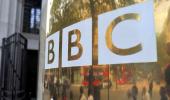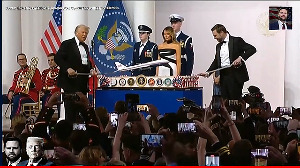The Income Tax authorities have left the offices of the BBC in New Delhi and Mumbai after three days of lengthy questioning of some of its staff, the United Kingdom-headquartered public broadcaster said on Thursday.

The BBC said it will continue to cooperate with the authorities after the I-T 'survey' action at the broadcaster's India offices began on Tuesday morning and lasted around 60 hours.
It said the priority for it now was to support its staff, many of whom have had to stay overnight in the offices during the course of the I-T enquiries, and that it will continue to report without 'fear or favour'.
'The Income Tax Authorities have left our offices in Delhi and Mumbai, a BBC spokesperson said in the broadcaster's latest statement on Thursday evening.
'We will continue to cooperate with the authorities and hope matters are resolved as soon as possible. We are supporting staff some of whom have faced lengthy questioning or been required to stay overnight and their welfare is our priority,' the spokesperson said.
The broadcaster said its output is now back to normal and reiterated its previous statement that it remains committed to 'serving our audiences in India and beyond'.
The BBC is a trusted, independent media organisation and we stand by our colleagues and journalists who will continue to report without fear or favour, the spokesperson added.
Sources in the BBC described the situation as having been stressful and disruptive, with some staff facing long periods of questioning as well as being required to stay overnight in the offices.
In New Delhi, officials had indicated the I-T surveys were being carried out to investigate issues related to international taxation and transfer pricing of BBC subsidiary companies, and alleged that the BBC had been served with notices in the past but was 'defiant and non-compliant' and had significantly diverted its profits.
British government sources had indicated that the situation was being closely monitored, without issuing any official statement related to the tax authorities' action.
The move came weeks after the broadcaster aired a controversial two-part documentary in the UK, India: The Modi Question, referencing Prime Minister Narendra Modi and the 2002 Gujarat riots.
The Indian government had condemned the series as a propaganda piece, designed to push a particular discredited narrative .
The British government was forced to address the issue in the House of Commons after Indian diaspora protests against the documentary at the end of last month to stress that the BBC as a media outlet was independent in its output and reiterated its commitment to enhance ties with India.
As the news of the I-T surveys unfolded, some UK-based media commentators expressed their shock and others lamented its poor timing given India's G20 presidency.
"My view is that it was badly timed given there are G20 meetings, but it was not intentional. Income Tax authorities in India are always peculiar about their procedures," said Meghnad Desai, leading Indian-origin economist and House of Lords peer.
While UK-based human rights organisation South Asia Solidarity Group dubbed it a blatantly vindictive move , Amnesty International declared it was a blatant affront to freedom of expression .
The I-T department is yet to issue a formal statement on the action.











 © 2025
© 2025